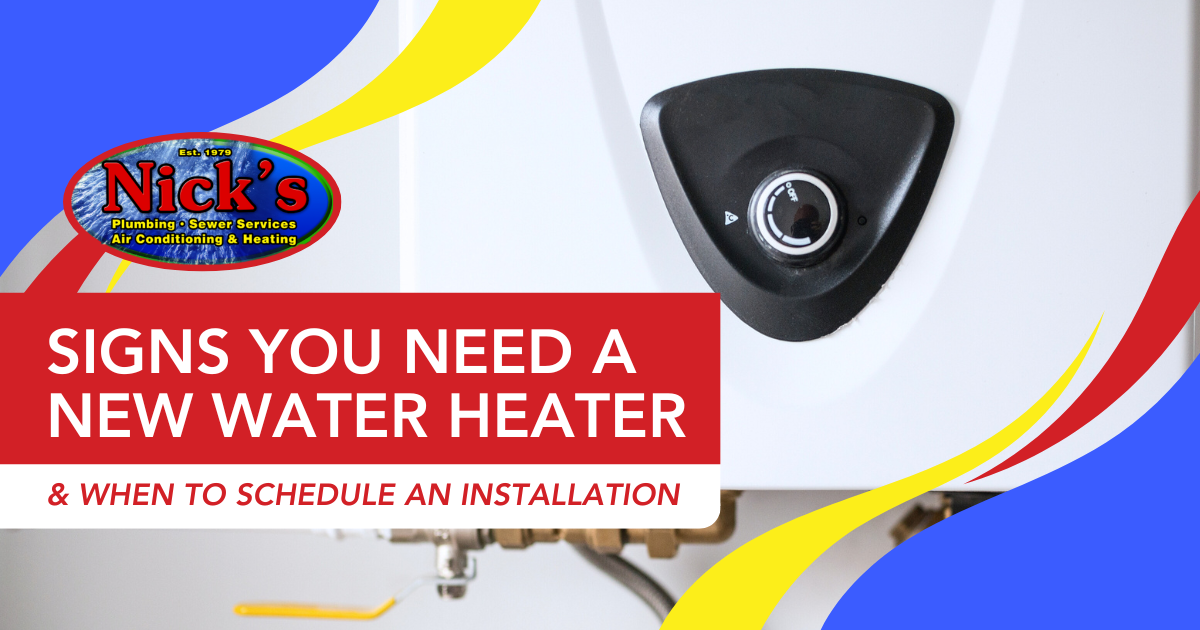We’ve said it many times over the years, but nobody pays attention to their water heater—until it causes a problem. Of course, this is completely the opposite of how we should treat our water heaters, as they require regular maintenance and inspections to ensure they’re working to their full potential.
For more than 100 years, the tank-type water heater has been the standard for about 80% of homes. Over that time, many improvements have been made to the original design to make water heaters more efficient, powerful, and safer.
Water heater expansion tanks were introduced in the late 1950s. Before that, residential water heaters were designed as “closed systems,” where water was stored in a single tank without any way of accommodating the thermal expansion of the water in it. This expansion can lead to pressure buildup and potentially damage the water heater or the plumbing system.
I’m already getting ahead of myself, though. Let’s start with the basics.
What is a Water Heater Expansion Tank?
A water heater expansion tank is a small tank installed on the cold water supply line to a water heater. Its purpose is to help protect the water heating system and plumbing from damage caused by thermal expansion.
When water is heated, it expands, and the volume increases. In a closed plumbing system, the expanding water has nowhere to go and can cause pressure to build up, potentially leading to leaks or damage to the water heater or plumbing system. An expansion tank provides a space for the expanding water to go, helping to reduce the pressure and protect the system.
The expansion tank is typically made of steel or other materials designed to withstand high pressure. A rubber diaphragm or bladder inside the tank separates the air from the water. As the water expands, it enters the expansion tank and compresses the air or bladder inside. When the hot water is used, and the temperature decreases, the water inside the expansion tank is pushed back into the main water supply.
In many areas, water heater expansion tanks are typically required by plumbing codes for water heating systems with a backflow prevention device, pressure-reducing valve, or check valve installed in the plumbing system.
In summary, a water heater expansion tank is recommended as a safety measure to protect your water heater and plumbing system from damage caused by thermal expansion.
Does a Water Heater Require an Expansion Tank?
Whether or not a water heater requires an expansion tank depends on several factors, such as the type of water heating system you have, the size of the system, and the local plumbing codes and regulations.
In general, most residential water heating systems with closed plumbing systems require an expansion tank to prevent damage caused by thermal expansion. This includes systems with a backflow prevention device, pressure-reducing valve, or check valve, as these devices can cause the water pressure to increase and lead to thermal expansion.
However, an expansion tank may not be necessary if your water heating system has an open plumbing system, such as an open-loop solar heating system or a gravity-fed system.
It’s always best to consult a licensed plumber regarding local plumbing codes to determine whether your specific water heating system requires an expansion tank.
Can I Install an Expansion Tank Myself?
A homeowner can install their own water heater expansion tank. Still, it is recommended that they have some knowledge of plumbing and experience working with water heaters. The installation involves turning off the water supply to the water heater, draining the water heater, and installing the expansion tank on the cold water supply line.
The expansion tank is necessary to prevent excess pressure from building up in the water heater and potentially causing damage. However, suppose you are not comfortable with the installation process. In that case, it is recommended that you hire a licensed plumber to perform the installation to ensure it is done correctly and safely.
What Can Cause an Expansion Tank to Fail?
Several factors can cause an expansion tank to fail over time. The most common causes of expansion tank failure include the following:
Corrosion
The interior of the tank may corrode over time due to the chemical reactions that occur with the water inside.
Waterlogging
If the tank becomes waterlogged, it loses its ability to regulate pressure, which can cause it to fail.
High Pressure
If the water pressure in the system is too high, it can cause the expansion tank to fail or rupture.
Poor Installation Methods
Incorrect installation of the expansion tank, such as improper orientation or connection to the system, can lead to failure.
Age
Like all mechanical components, expansion tanks have a limited lifespan and will eventually wear out and need replacement.
Regular water heater maintenance and inspection of the expansion tank can help prevent these issues and ensure its proper function. It is recommended to have a licensed plumber inspect the expansion tank at least once a year and replace it if necessary.
How Do I Know When My Water Heater Expansion Tank Is Failing?
Several signs may indicate that a hot water expansion tank is faulty and needs replacing. These signs include:
Leaks
If you notice water leaking from the expansion tank, it is a sign that it may be failing.
Reduced Water Pressure
If the water pressure in your home has dropped or the water flow from the hot water faucet is weak, it may be due to a bad expansion tank.
Noisy Pipes
If you hear banging or knocking sounds from your pipes when you turn on the hot water, it could be due to a failing expansion tank.
Rust or Corrosion
If you notice rust or corrosion outside the expansion tank, it may be a sign that the tank is deteriorating and needs to be replaced.
Increased Energy Bills
A bad expansion tank can cause your water heater to work harder than necessary, leading to higher energy bills.
If you notice any of these signs, it is recommended to have a licensed plumber inspect the hot water expansion tank to determine if it needs to be replaced.
How Long Will a Water Heater Expansion Tank Last?
The lifespan of a water heater expansion tank can vary depending on various factors such as usage, water pressure, and the quality of the tank itself. However, on average, an expansion tank can last 5 to 10 years or even longer if properly maintained and inspected regularly. It is recommended to check the expansion tank for signs of damage or wear, such as leaks or rust, at least once a year and replace it if necessary. A licensed plumber can also help inspect and replace the expansion tank.
What is the Cost to Install or Replace an Expansion Tank?
The cost to install or replace a water expansion tank can vary depending on several factors, such as the type and size of the tank, the location of the tank, and the cost of labor in your area. A basic expansion tank installation or replacement ranges from $150 to $500, with most homeowners paying around $250 to $350 for a standard installation. However, the cost can be higher if additional plumbing work is needed, or the installation is more complex.
Getting multiple quotes from licensed plumbers in your area is recommended to compare prices and ensure you get a fair price for installing or replacing your water expansion tank. Additionally, some manufacturers offer tank warranties that can help offset the replacement cost if the tank fails within a certain period.
Thinking About Adding an Expansion Tank to Your Water Heater?
Plumbing is a confusing subject, as most homeowners don’t know enough about their home’s plumbing structure or the condition that it is in. Water heater expansion tanks make a lot of sense from a safety perspective and help reduce some of the wear and tear on your water heater. Unfortunately, many homeowners remain unaware of the benefits of an expansion tank and their existence entirely.
Nick’s Plumbing has been maintaining, repairing, and installing Houston’s water heaters and expansion tanks since 1979, and we understand how each home and its plumbing set-up can be unique. Let one of Nick’s licensed, experienced plumbing technicians inspect your current water heating situation and determine if an expansion tank is suitable for your home.


























